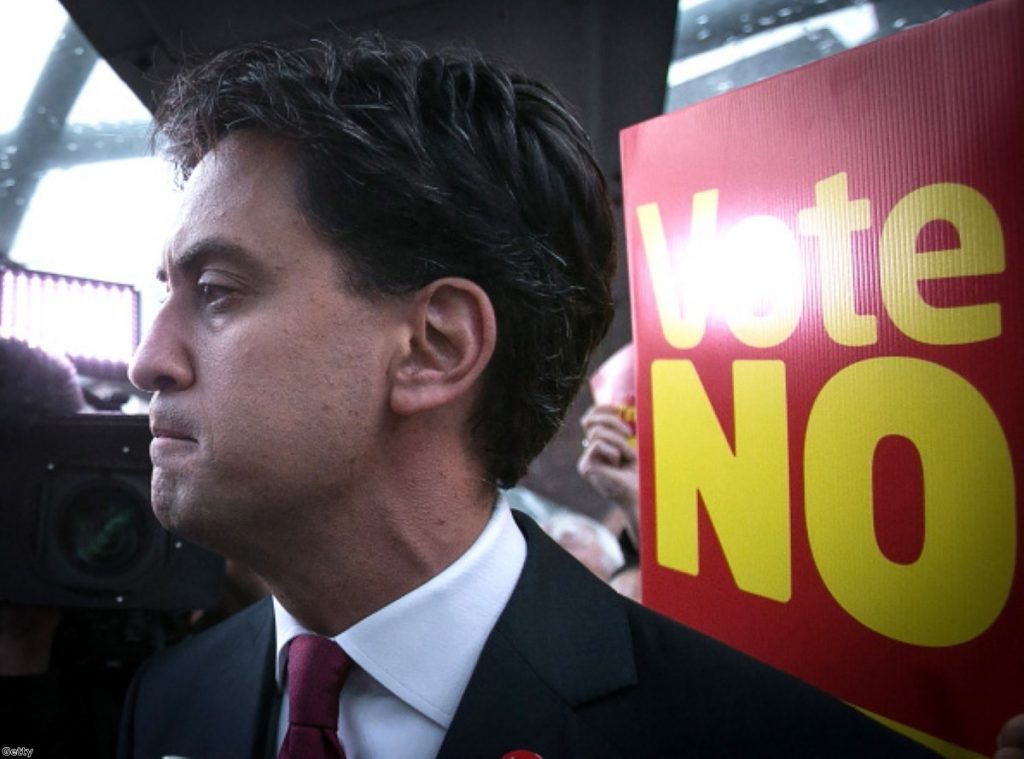Labour’s Scottish collapse reveals a wider rot in their support
Ed Miliband's hopes of becoming prime minister of a majority Labour government are dead.
Their demise was confirmed this morning when Lord Ashcroft released details of his first batch of Scottish constituency polls.
They reveal a truly stunning SNP surge since the end of the referendum campaign. Seats which previously would have been seen as untouchable now look like easy gains for the SNP.
Even in Labour's stronghold seats like Glasgow North West the party is set for disaster, with the SNP set to go from just 15% of the vote to 44%. In Motherwell and Wishaw, the party's 43% majority over the SNP is set to be turned into an 11% deficit.


If repeated across Scotland, the SNP would take all but a handful of Labour seats, with several Labour heavyweights including Douglas Alexander out of a job. Labour's half century dominance of Scottish politics is now over. Ed Miliband's hopes of governing alone are shot.
It will be tempting for Labour to blame the collapse on the Scottish referendum result and it is certainly true that Labour's decision to work – in Alex Salmond's words – "hand in glove" with the Tories have seriously damaged their chances. It will also be tempting for them to blame the collapse on Ed Miliband and it's certainly true that he is not a great sell for the party north of the border.
But the roots of Labour's collapse actually lie much deeper and reflect a far wider problem for the Labour party right across the UK.
The @LordAshcroft Scottish polling pic.twitter.com/StconhCurk
— Mike Smithson (@MSmithsonPB) February 4, 2015
For too long Labour have assumed that their core voters in Scotland, Wales and the North, would stay with them no matter what. The assumption that these voters had nowhere else to go became firmly rooted in the party as they concentrated instead on winning over a handful of swing voters in a handful of marginal seats.
For many years this strategy seemed sensible. Tony Blair used it to win three consecutive Labour governments and as party membership declined, their choice soon became a necessity. With so few resources to hand, Labour had little option but to largely ignore their core constituencies.
But this strategy has come at a price and it is a heavy one. As today's polls reveal, the problem with assuming that your voters have nowhere else to go is that eventually they will find somewhere. Be it the SNP in Scotland, Ukip in Wales and rural England or the Greens on the South Coast, Labour's core vote are increasingly finding other places to put their vote.
If this trend continues then Labour's 'core' support will soon be reduced to London and several other big metropolitan areas. Even these areas may be on the turn. A recent YouGov poll for the Evening Standard found that Labour's support in London is no longer running ahead of their support across the rest of the country. And while the party has long viewed it as a "Labour city," Londoners have twice elected a Tory mayor.
For a long time Labour have ignored this collapse in support. First they denied it. Then they suggested that it didn't really matter. Now they are reduced to hoping that these voters will somehow return by May when faced with the prospect of another Tory government.
This reaction highlights the root of the problem. By assuming these voters are somehow 'theirs' and will inevitably come home, Labour reveals the complacency and misplaced sense of ownership they have had for too long. This is seen most clearly in the party's current campaign against the Greens where claims of 'vote green, get blue' are being tested to destruction.
But what this ignores is that modern voters are far less tribal than ever before. With every passing generation, voters become more mobile and more willing to give smaller parties a try. Labour can no longer assume that any voter is 'theirs' for life. In modern politics every vote needs to be won on its own merits, whether it be in Glasgow, Brighton, Cardiff or Kent.
It is probably too late to face up to this problem now. Current national polls suggest that Labour are still narrow favourites to win the most seats across the UK, although today's Scottish polls make that far less likely than it once was. But even if Ed Miliband does scrape into Downing Street in May, Labour face a massive task to rebuild their support not just in Scotland, but across the whole of the UK.

